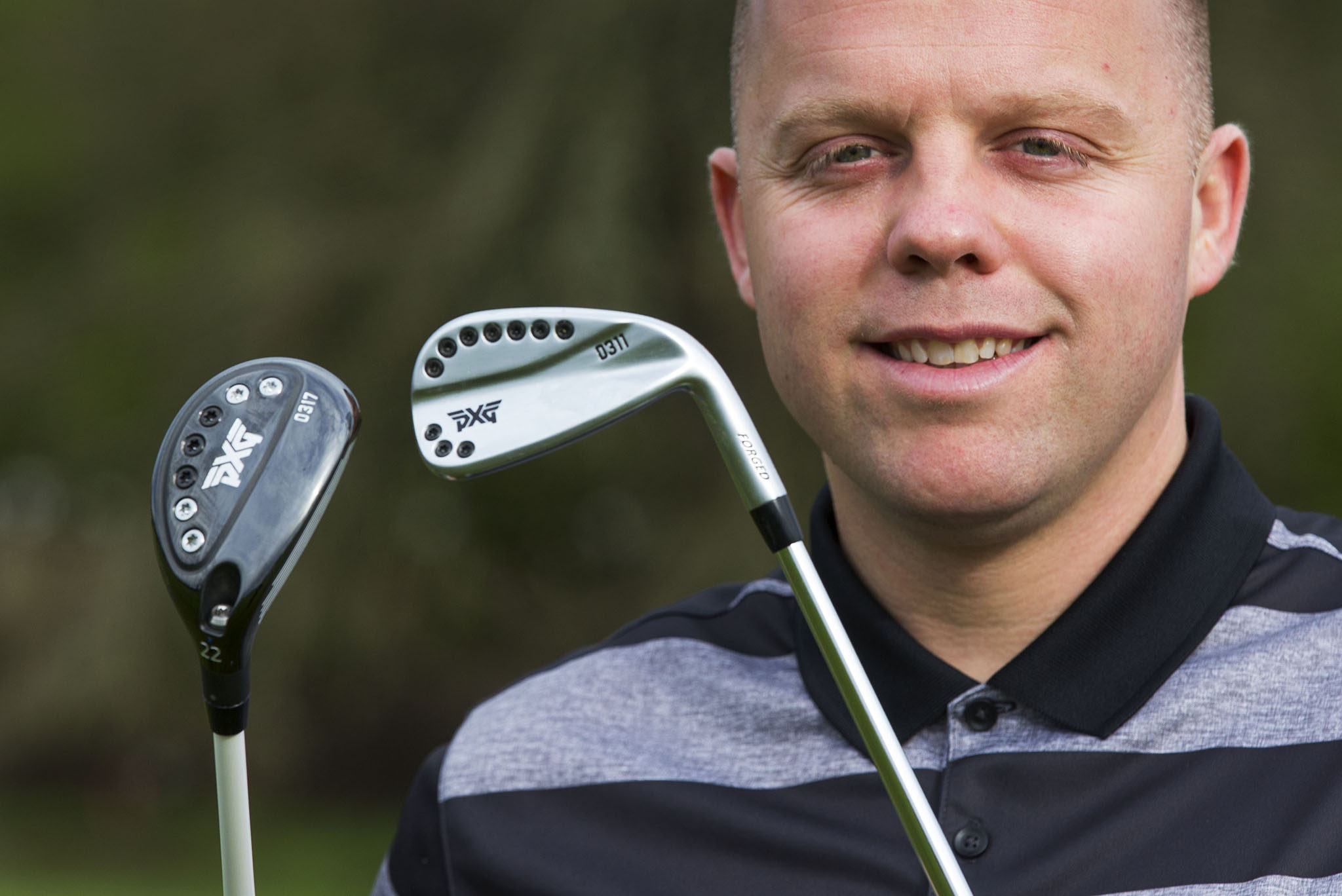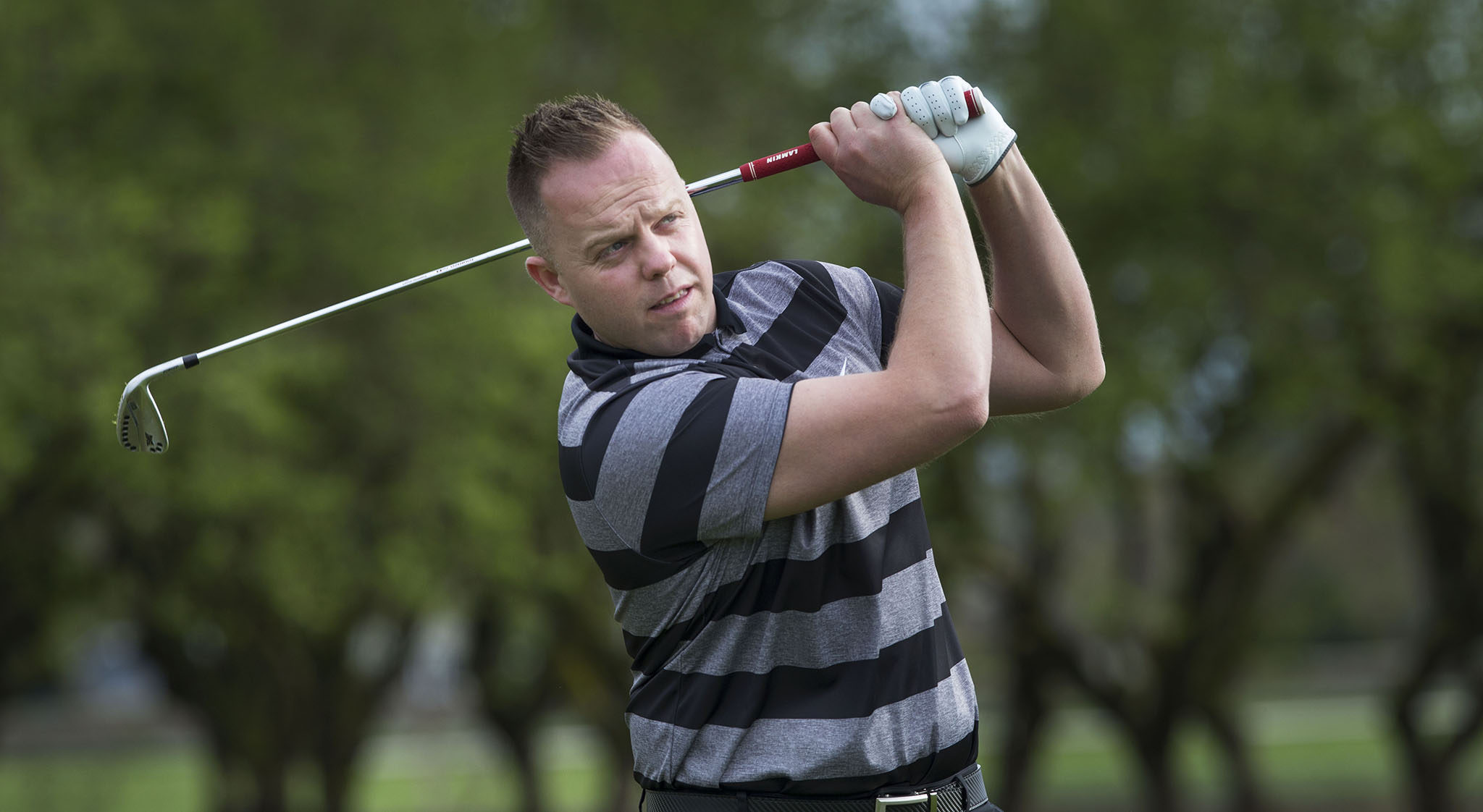An exclusive club: PXG is hi-tech, hi-performance, high price

A set of PXGs could run more than $5,000, the irons are $350 each; try them, and you’ll know why
It was perfect harmony, it was something truly sweet and special, and Tyler Fisher knew it immediately.
It was love at first swing.
Understand that he’d explored other options first, and he wasn’t new to this game, so there had been relationships before, a lot of them.
But the first time Fisher hit golf balls with the industry’s new big thing, PXG irons, he was ready to make a commitment.
Even at $350. Per club.
“I’ve been in the golf business my whole life,” said Fisher, 30, a Cottage Grove High School graduate whose first job was picking up golf balls at the range at Fiddler’s Green, and who graduated from a golf academy in Arizona and has worked for Golfsmith International, TaylorMade and now is the sales rep for E-Z-Go golf carts in Oregon and Washington.
“I’ve played every single golf club there is. And this is by far the best iron I’ve ever hit in my life. And I’ve had a lot of clubs.”
And so recently, after trying several other high-end irons — Mizuno, Callaway, TaylorMade — Fisher bought seven steel-shafted PXG 0311 irons, 4 through pitching wedge, a value of $2,450, “absolutely” the most he’s spent on clubs.
“This is truly the best club,” said Fisher, who lives in Creswell and plays to a 2.6 handicap. “It’s the most consistent ball flight that I’ve ever hit. … It almost feels like I’m not hitting a golf ball at all. It’s amazing.”
PXG, which stands for Parsons Xtreme Golf, is the inspiration of Bob Parsons, the billionaire founder of GoDaddy, the Internet web host and domain registrar, and an avid golfer.
A 10-handicap, Parsons had tried all sorts of clubs, and at the end of 2014 added up how much he’d spent on golf equipment the previous year.
“I thought it was $250,000 but I was stunned when I found out it was closer to $350,000,” Parsons told Scott Bordow of the Arizona Republic. “I said, ‘I have a worse problem than I thought’ …
“I really enjoy fiddling with golf clubs because at my level, my talent stops right here and hits a brick wall. The only way it’s going to inch forward is with equipment.”
Parsons reached out to a former Ping designer and proposed this: Create the best golf club possible, regardless of cost, figuring that if the clubs are demonstrably better, serious golfers will purchase them.
How will they know they’re better, Parsons was asked.
“They’ll hit it,” Parsons said. “They’ll hit it one time, and they’ll know.”
Serious is the word for the cost. The irons are $350 each ($375 each with graphite shafts) the hybrids and putters sell for $400, the fairway woods $500, the driver $700, so that a golfer who purchased an entire set, depending on configuration, would be spending north of $5,000.
“We make a top-end golf club the way Ferrari makes a top-end car,” Parsons told the Republic.
The clubs that draw the rave reviews are the PXG irons, a hollow body design that is filled with thermoplastic elastomer that allows for a thinner, blade-like face. The PXG’s signature look is created by 10 tungsten alloy screws that enhance the perimeter weighting and increase forgiveness. The result, clubs that launch high and carry far, with a soft feel on impact.
This year, 15 players on the PGA and LPGA Tours are playing PXGs, including Zach Johnson and Lydia Ko, and such has been the Scottsdale, Ariz., company’s success that, Bordow reported, it has grown from 33 employees in December 2015 to just over 100.
Ducks on board
Last fall, the University of Oregon men’s and women’s teams became the first college program in the nation to reach agreement to play PXGs, provided without cost by the manufacturer.
Oregon men’s coach Casey Martin said the move resulted from a combination of factors — the quality of the clubs, Nike’s decision to stop making golf equipment and Martin’s relationship with the former Ping employees now working for PXG, stemming from his use of Ping clubs from his earliest days as a professional.
“They’re incredible irons,” Martin said. “They’re the best irons I’ve ever hit.”
Although the Oregon players aren’t required to play PXGs if they prefer other clubs, almost all the Ducks are doing so; some are transitioning as the clubs are tweaked to fit their games, and others, including senior Wyndham Clark, the nation’s No. 1-ranked men’s collegiate player, began using them immediately last fall.
While PXG will add other collegiate programs, Martin sees the PXG relationship as a recruiting tool. Meanwhile, the men’s team’s performance this season has offered some validation, with four tournament wins en route to a No. 5 national ranking.
“We’ve been going gangbusters,” Martin said.
At Fiddler’s Green, the golf shop north of Eugene, manager Jerry Whalen heard of PXG early last year, but was reluctant to enter the market, figuring there wouldn’t be much demand here for a $350 iron — the most expensive iron Fiddler’s Green has ever sold.
“If we sold a set that was $150 an iron, in my mind that was an expensive golf club,” Whalen said. “I can remember selling Spalding Executives for $200 for a set of eight irons.” Currently, Fiddler’s sells the well-regarded Callaway Great Big Bertha irons for $162 each; an average steel-shafted iron sells for about $70 per iron, Whalen said.
But as customers learned about the PXG clubs and wanted to try them, Whalen invested in demo clubs and became an approved fitting center for PXG.
“We brought it in thinking we’d sell a couple of sets of them, and we’ve sold probably eight to 10 sets, which really surprised me,” Whalen said. “They do have a different feel to them, and they do work. People are accepting the price point. They see the difference when they go out and hit them.”
Most of the sales have come with the irons, and some customers have bought a few irons and then returned to add more. Whalen said customer consensus is that the irons are difference-makers, and the hybrids and fairway woods also excellent; there is less enthusiasm about the drivers (PXG makes three models) as compared with other high-end drivers, and he’s only sold a couple of those.
High price, lower scores
Although PXG makes an “Xtreme Forgiveness” offset set of irons for higher-handicap players, as well as a Tour model, the company’s main line PXG 0311 clubs seem to hold great appeal for low handicap players seeking an additional edge at a level where measurable improvement becomes extremely challenging.
Kim Wenger, a 67-year-old former superintendent at Fiddler’s Green golf course and former girls golf coach at South Eugene High School, tried the PXG irons in January, when he went to Fiddler’s to seek graphite shafts, having played steel-shafted Pings for about 15 years. He was smitten immediately and purchased six PXG 0311 irons, 5-iron through pitching wedge.
A 6.4 handicap at the end of 2016, Wenger was trending toward 4.5 with scores posted when the reporting period resumed in March; he’s recently posted scores as low as 70, 72, 73 and 74 at Emerald Valley Golf and Resort.
“I’ve played some pretty good golf with them,” Wenger said. “It’s not as if all of a sudden my swing has suddenly changed. I just hit the ball better.”
Scotty McConnell, 56-year-old president and CEO of the Feynman Group in Eugene, has seen his handicap trend from the high 12s down into the 10s. McConnell, who purchased the clubs last summer, said he only had to hit the irons “once” to know their quality, and wound up purchasing almost a complete set — PXG 0311 6-iron through 9, four wedges, two hybrids, a 3-wood and driver.
“The drastic technology is in those freakin’ irons,” McConnell said. “I’m getting tee to green so much better.”
Neal Brown, a 53-year-old executive for Umpqua Bank in Roseburg, already a scratch golfer, purchased the PXG 0311 5-iron through 9, two wedges and a hybrid. “I hit the clubs and fell in love with them the first time I hit them,” said Brown, who recently used his new 7-iron to record a hole-in-one from 165 yards at Roseburg Country Club, his fourth.
Whalen, who initially wondered if there might be more “sizzle” than substance to PXG clubs, has become a believer.
“At first, I thought we’d try them and have them for six months and if we don’t sell many of them at least we tried them, and maybe in a year PXG won’t be around,” Whalen said. “But I think they’re here to stay.”
And if those clubs aren’t in your budget, well, there are options.
“We have irons we make here that we sell a set of eight for (a total of) $150,” Whalen said. “There are a lot more people coming in looking for that set of clubs than the PXGs.”
This story originally appeared in the Eugene Register-Guard on April 18, 2017.

